Impact of IFRS Adoption on Australian Accounting
VerifiedAdded on 2024/05/31
|10
|1898
|317
AI Summary
This report examines the impact of International Financial Reporting Standards (IFRS) on the accounting and reporting of financial statements in Australia. It provides a comparative analysis of the pre- and post-IFRS adoption periods, highlighting the benefits and challenges associated with IFRS implementation. The report explores key areas such as goodwill recognition, earning management, accounting quality, and financial reporting efficiency, demonstrating how IFRS has influenced the Australian accounting landscape.
Contribute Materials
Your contribution can guide someone’s learning journey. Share your
documents today.
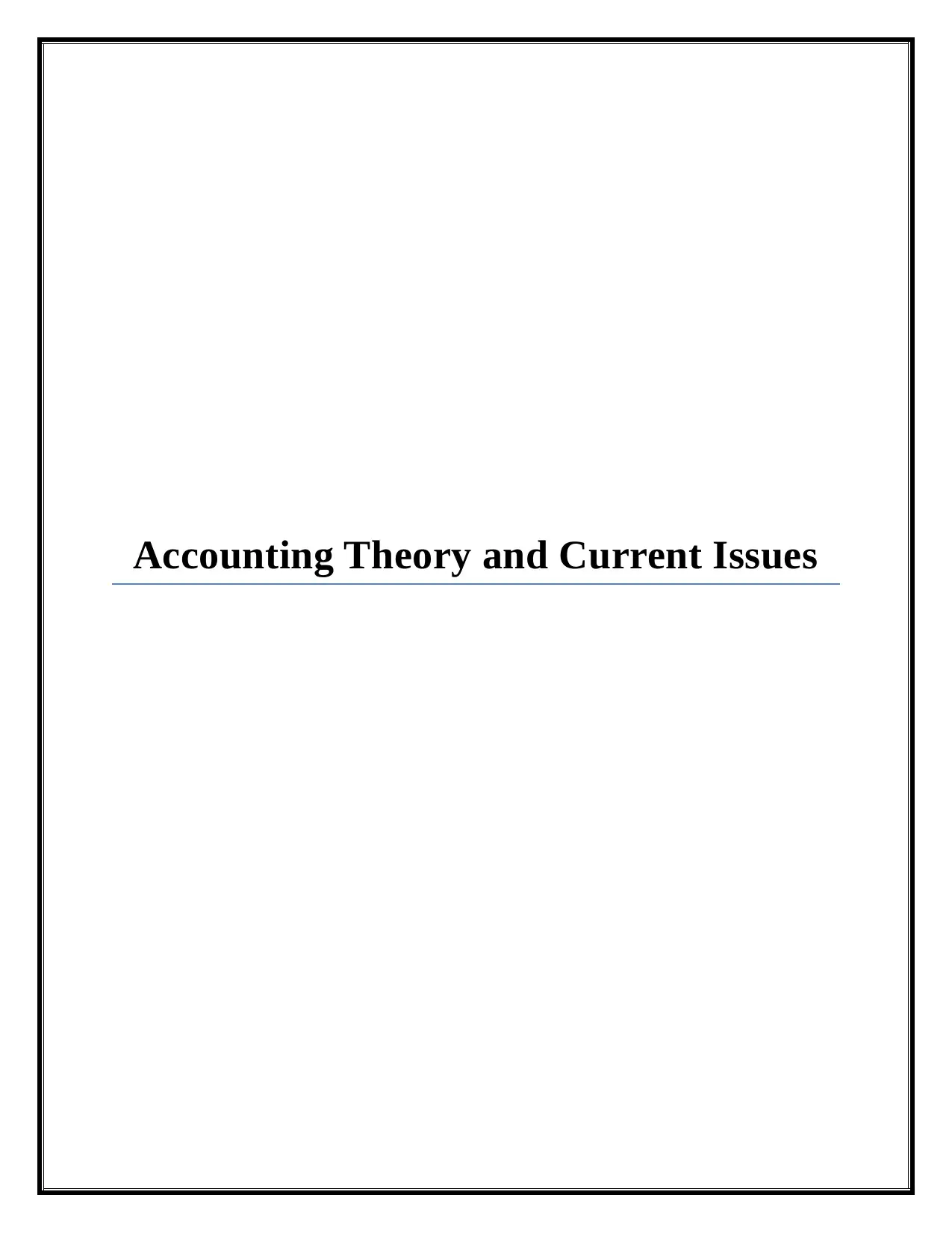
Accounting Theory and Current Issues
Secure Best Marks with AI Grader
Need help grading? Try our AI Grader for instant feedback on your assignments.
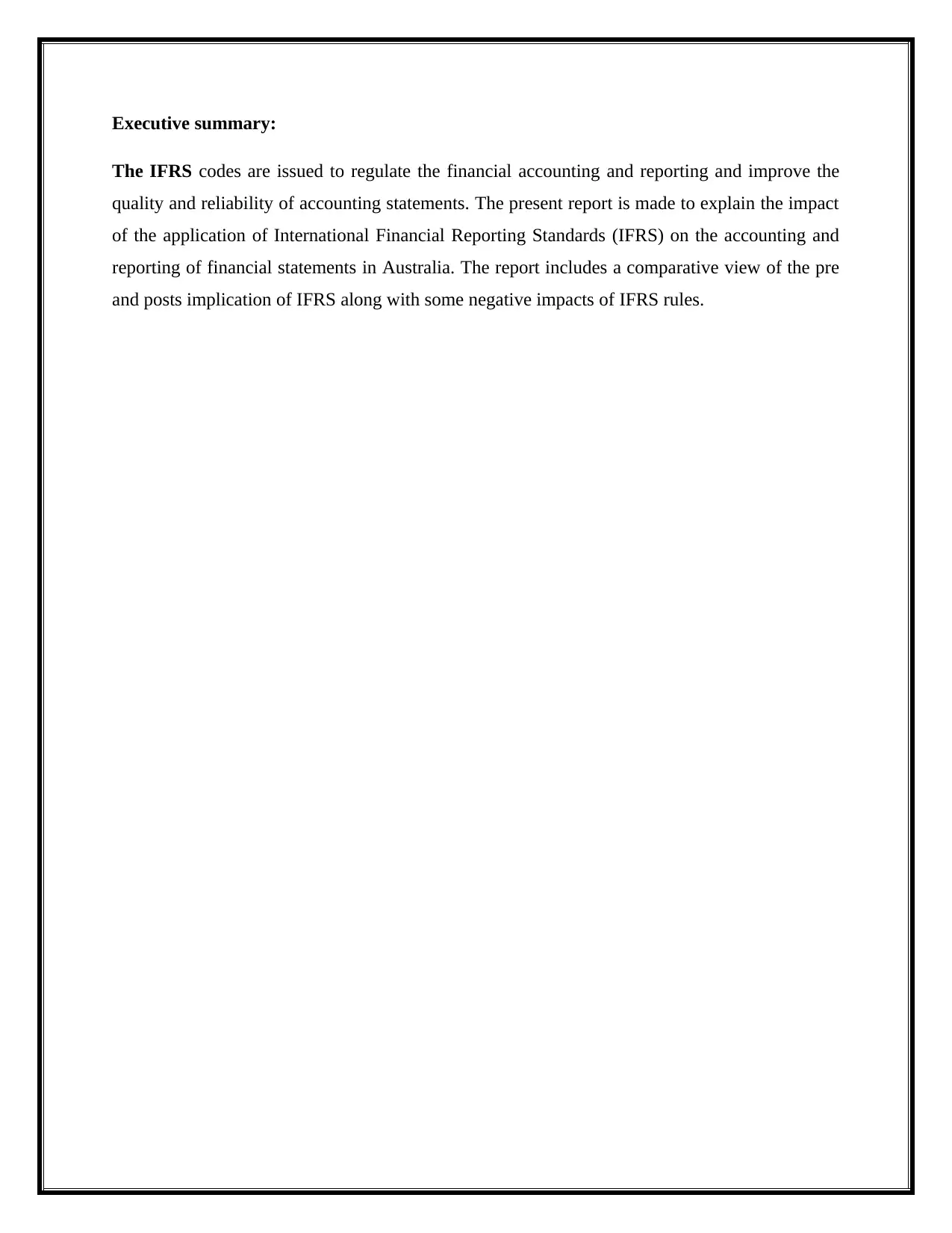
Executive summary:
The IFRS codes are issued to regulate the financial accounting and reporting and improve the
quality and reliability of accounting statements. The present report is made to explain the impact
of the application of International Financial Reporting Standards (IFRS) on the accounting and
reporting of financial statements in Australia. The report includes a comparative view of the pre
and posts implication of IFRS along with some negative impacts of IFRS rules.
The IFRS codes are issued to regulate the financial accounting and reporting and improve the
quality and reliability of accounting statements. The present report is made to explain the impact
of the application of International Financial Reporting Standards (IFRS) on the accounting and
reporting of financial statements in Australia. The report includes a comparative view of the pre
and posts implication of IFRS along with some negative impacts of IFRS rules.
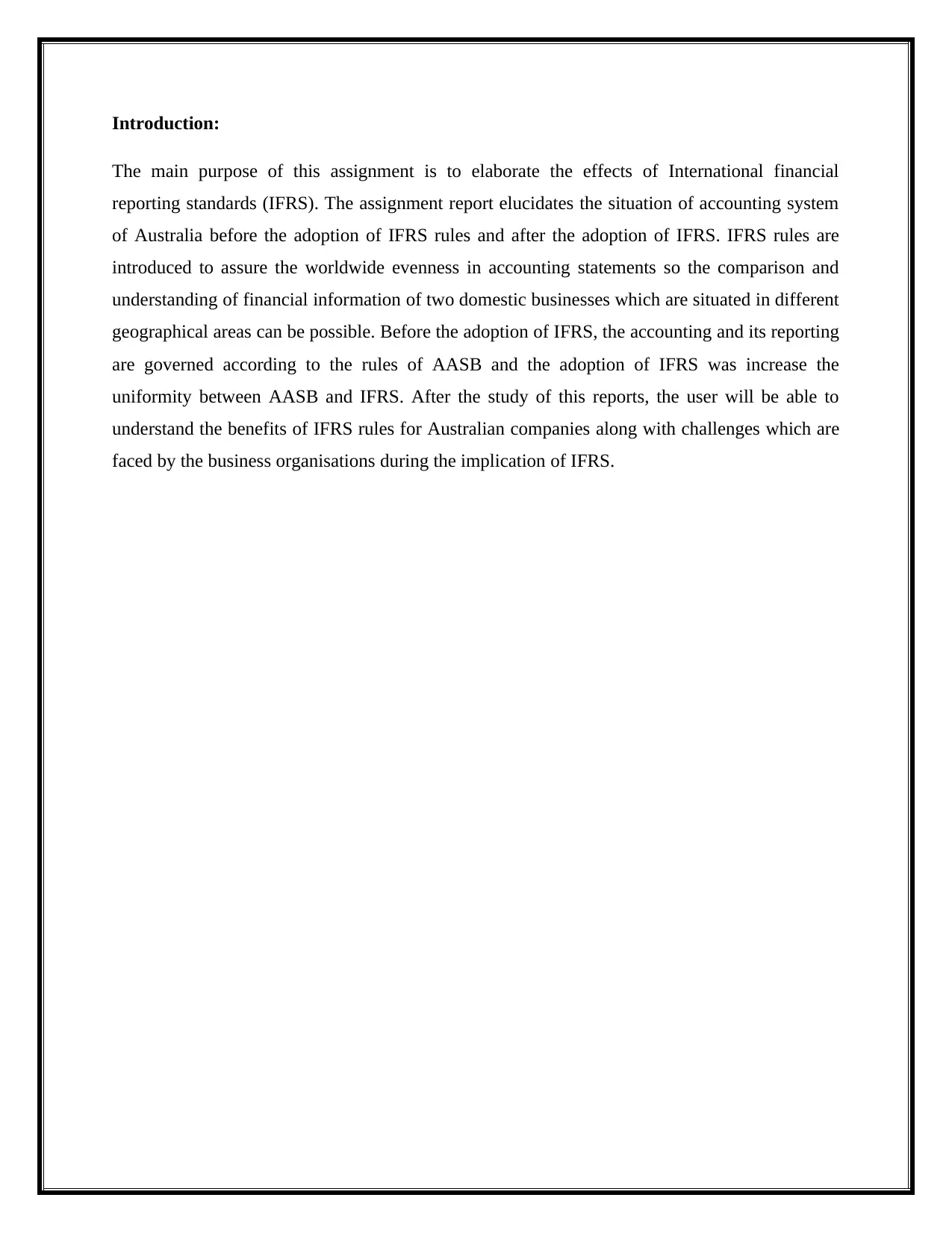
Introduction:
The main purpose of this assignment is to elaborate the effects of International financial
reporting standards (IFRS). The assignment report elucidates the situation of accounting system
of Australia before the adoption of IFRS rules and after the adoption of IFRS. IFRS rules are
introduced to assure the worldwide evenness in accounting statements so the comparison and
understanding of financial information of two domestic businesses which are situated in different
geographical areas can be possible. Before the adoption of IFRS, the accounting and its reporting
are governed according to the rules of AASB and the adoption of IFRS was increase the
uniformity between AASB and IFRS. After the study of this reports, the user will be able to
understand the benefits of IFRS rules for Australian companies along with challenges which are
faced by the business organisations during the implication of IFRS.
The main purpose of this assignment is to elaborate the effects of International financial
reporting standards (IFRS). The assignment report elucidates the situation of accounting system
of Australia before the adoption of IFRS rules and after the adoption of IFRS. IFRS rules are
introduced to assure the worldwide evenness in accounting statements so the comparison and
understanding of financial information of two domestic businesses which are situated in different
geographical areas can be possible. Before the adoption of IFRS, the accounting and its reporting
are governed according to the rules of AASB and the adoption of IFRS was increase the
uniformity between AASB and IFRS. After the study of this reports, the user will be able to
understand the benefits of IFRS rules for Australian companies along with challenges which are
faced by the business organisations during the implication of IFRS.
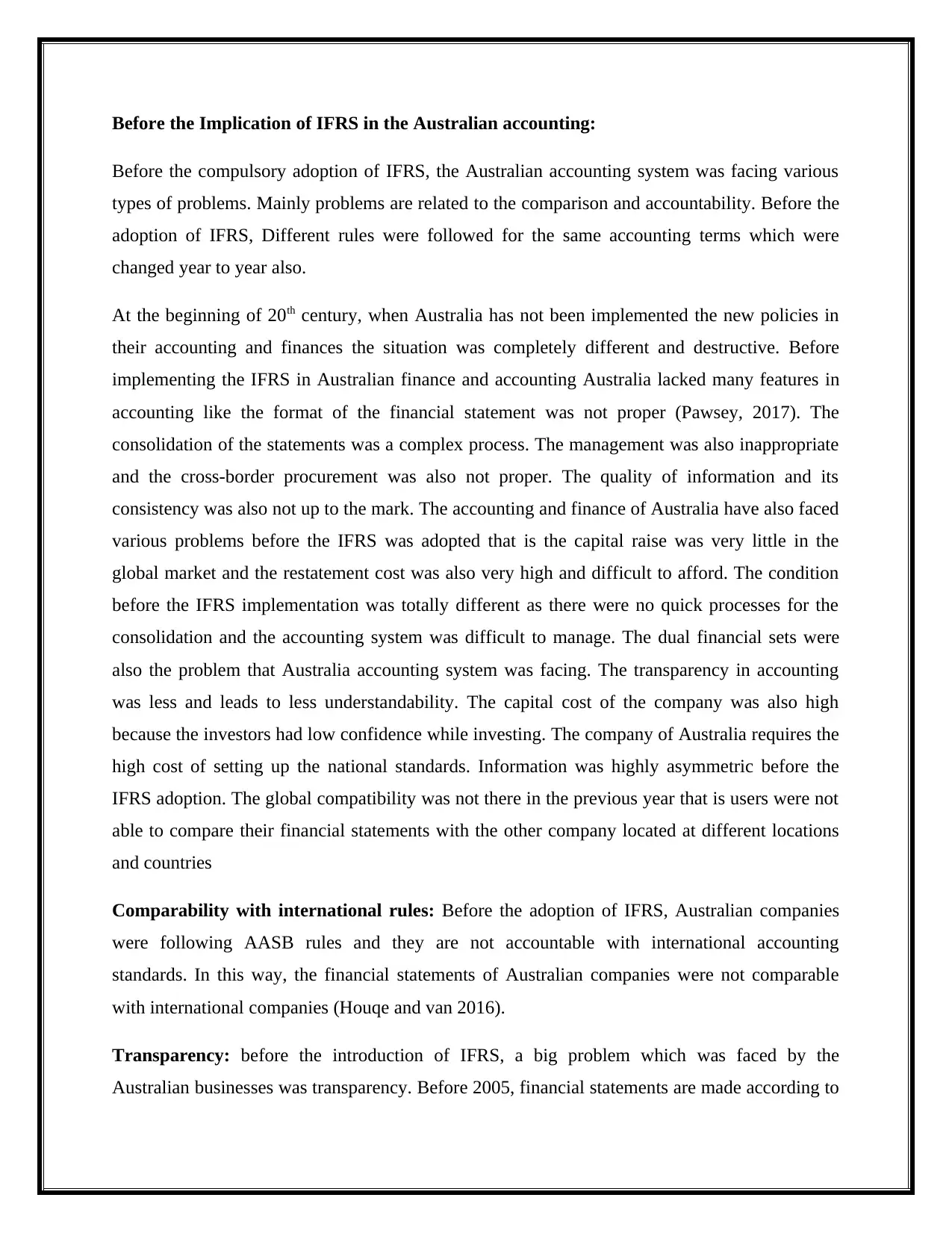
Before the Implication of IFRS in the Australian accounting:
Before the compulsory adoption of IFRS, the Australian accounting system was facing various
types of problems. Mainly problems are related to the comparison and accountability. Before the
adoption of IFRS, Different rules were followed for the same accounting terms which were
changed year to year also.
At the beginning of 20th century, when Australia has not been implemented the new policies in
their accounting and finances the situation was completely different and destructive. Before
implementing the IFRS in Australian finance and accounting Australia lacked many features in
accounting like the format of the financial statement was not proper (Pawsey, 2017). The
consolidation of the statements was a complex process. The management was also inappropriate
and the cross-border procurement was also not proper. The quality of information and its
consistency was also not up to the mark. The accounting and finance of Australia have also faced
various problems before the IFRS was adopted that is the capital raise was very little in the
global market and the restatement cost was also very high and difficult to afford. The condition
before the IFRS implementation was totally different as there were no quick processes for the
consolidation and the accounting system was difficult to manage. The dual financial sets were
also the problem that Australia accounting system was facing. The transparency in accounting
was less and leads to less understandability. The capital cost of the company was also high
because the investors had low confidence while investing. The company of Australia requires the
high cost of setting up the national standards. Information was highly asymmetric before the
IFRS adoption. The global compatibility was not there in the previous year that is users were not
able to compare their financial statements with the other company located at different locations
and countries
Comparability with international rules: Before the adoption of IFRS, Australian companies
were following AASB rules and they are not accountable with international accounting
standards. In this way, the financial statements of Australian companies were not comparable
with international companies (Houqe and van 2016).
Transparency: before the introduction of IFRS, a big problem which was faced by the
Australian businesses was transparency. Before 2005, financial statements are made according to
Before the compulsory adoption of IFRS, the Australian accounting system was facing various
types of problems. Mainly problems are related to the comparison and accountability. Before the
adoption of IFRS, Different rules were followed for the same accounting terms which were
changed year to year also.
At the beginning of 20th century, when Australia has not been implemented the new policies in
their accounting and finances the situation was completely different and destructive. Before
implementing the IFRS in Australian finance and accounting Australia lacked many features in
accounting like the format of the financial statement was not proper (Pawsey, 2017). The
consolidation of the statements was a complex process. The management was also inappropriate
and the cross-border procurement was also not proper. The quality of information and its
consistency was also not up to the mark. The accounting and finance of Australia have also faced
various problems before the IFRS was adopted that is the capital raise was very little in the
global market and the restatement cost was also very high and difficult to afford. The condition
before the IFRS implementation was totally different as there were no quick processes for the
consolidation and the accounting system was difficult to manage. The dual financial sets were
also the problem that Australia accounting system was facing. The transparency in accounting
was less and leads to less understandability. The capital cost of the company was also high
because the investors had low confidence while investing. The company of Australia requires the
high cost of setting up the national standards. Information was highly asymmetric before the
IFRS adoption. The global compatibility was not there in the previous year that is users were not
able to compare their financial statements with the other company located at different locations
and countries
Comparability with international rules: Before the adoption of IFRS, Australian companies
were following AASB rules and they are not accountable with international accounting
standards. In this way, the financial statements of Australian companies were not comparable
with international companies (Houqe and van 2016).
Transparency: before the introduction of IFRS, a big problem which was faced by the
Australian businesses was transparency. Before 2005, financial statements are made according to
Secure Best Marks with AI Grader
Need help grading? Try our AI Grader for instant feedback on your assignments.
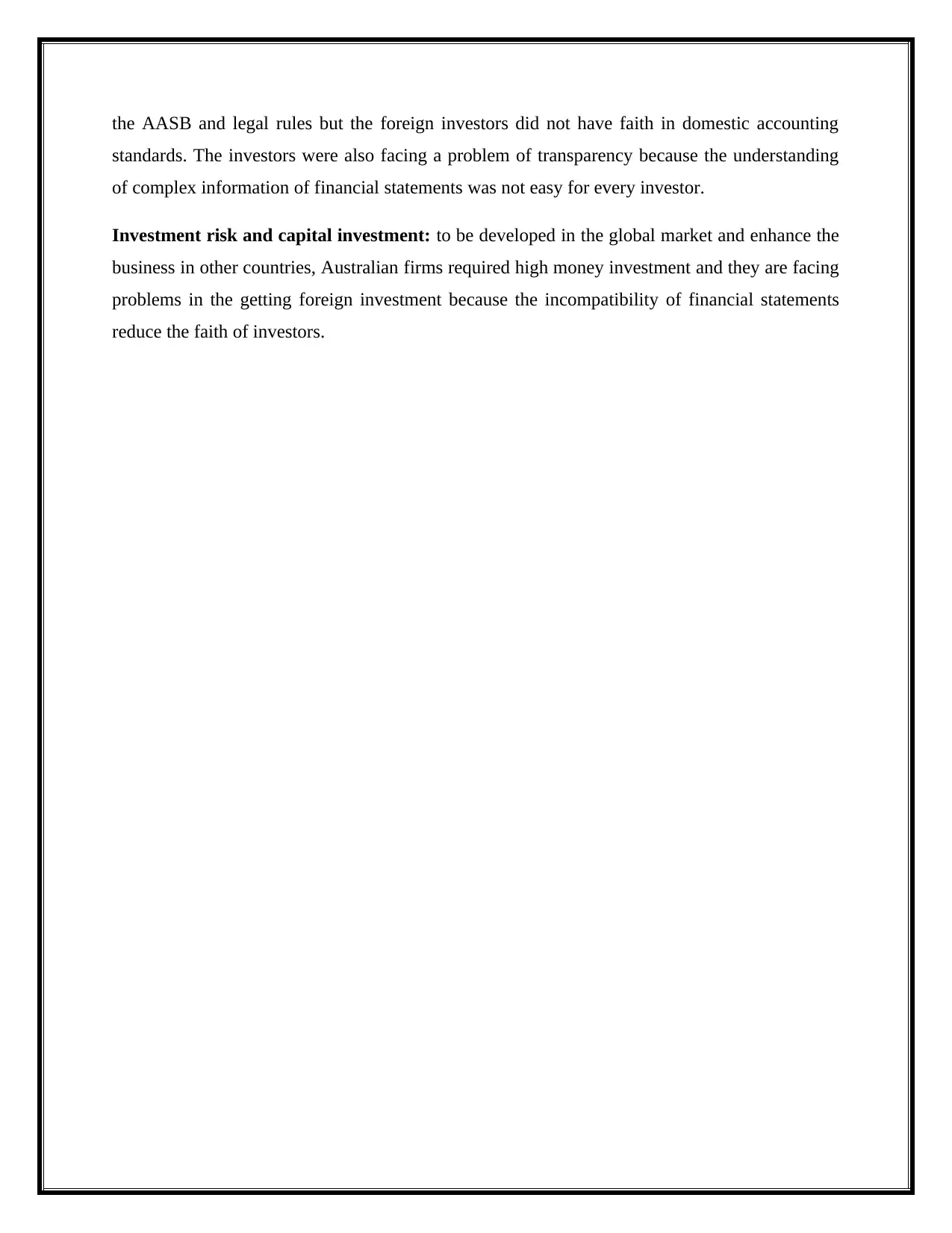
the AASB and legal rules but the foreign investors did not have faith in domestic accounting
standards. The investors were also facing a problem of transparency because the understanding
of complex information of financial statements was not easy for every investor.
Investment risk and capital investment: to be developed in the global market and enhance the
business in other countries, Australian firms required high money investment and they are facing
problems in the getting foreign investment because the incompatibility of financial statements
reduce the faith of investors.
standards. The investors were also facing a problem of transparency because the understanding
of complex information of financial statements was not easy for every investor.
Investment risk and capital investment: to be developed in the global market and enhance the
business in other countries, Australian firms required high money investment and they are facing
problems in the getting foreign investment because the incompatibility of financial statements
reduce the faith of investors.
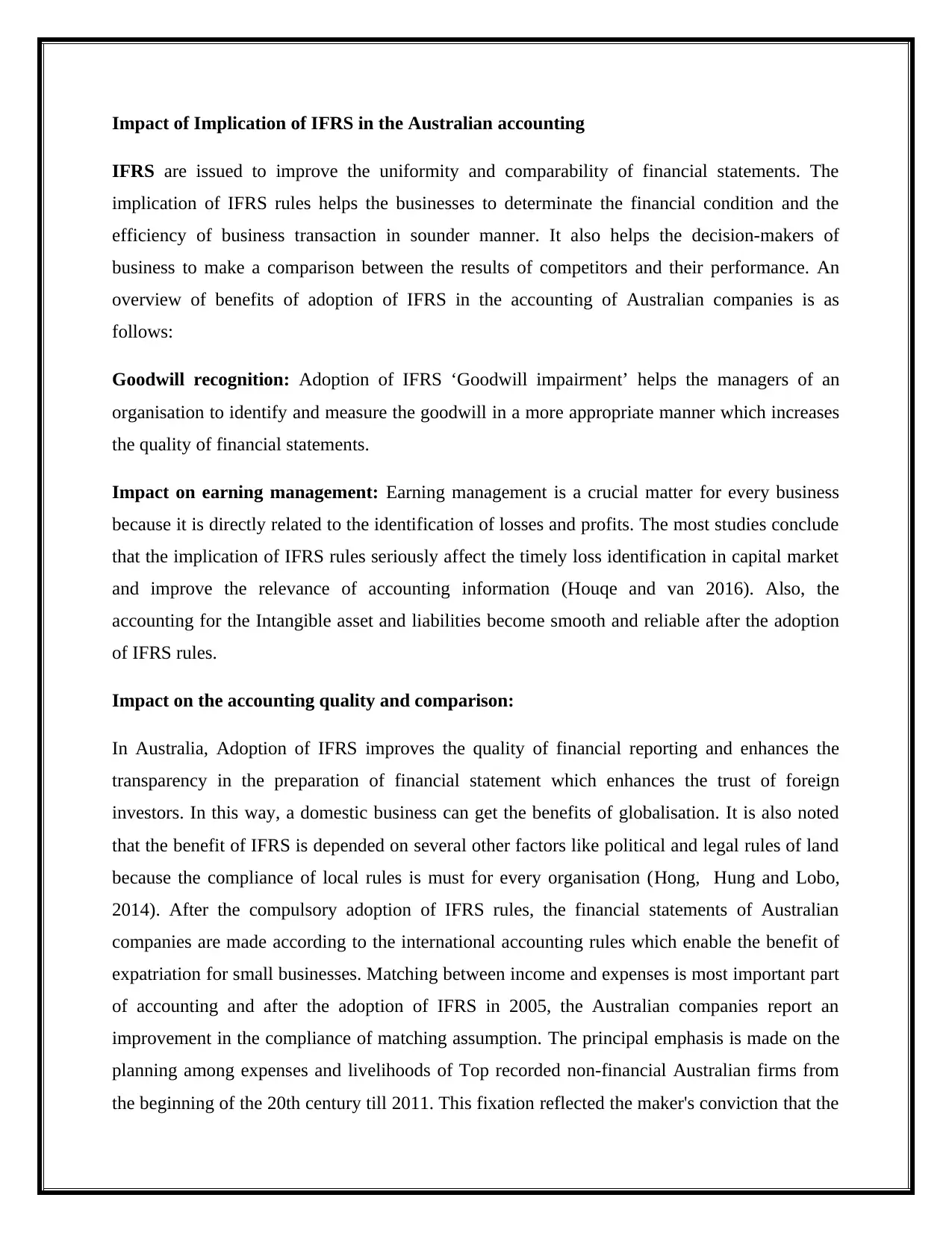
Impact of Implication of IFRS in the Australian accounting
IFRS are issued to improve the uniformity and comparability of financial statements. The
implication of IFRS rules helps the businesses to determinate the financial condition and the
efficiency of business transaction in sounder manner. It also helps the decision-makers of
business to make a comparison between the results of competitors and their performance. An
overview of benefits of adoption of IFRS in the accounting of Australian companies is as
follows:
Goodwill recognition: Adoption of IFRS ‘Goodwill impairment’ helps the managers of an
organisation to identify and measure the goodwill in a more appropriate manner which increases
the quality of financial statements.
Impact on earning management: Earning management is a crucial matter for every business
because it is directly related to the identification of losses and profits. The most studies conclude
that the implication of IFRS rules seriously affect the timely loss identification in capital market
and improve the relevance of accounting information (Houqe and van 2016). Also, the
accounting for the Intangible asset and liabilities become smooth and reliable after the adoption
of IFRS rules.
Impact on the accounting quality and comparison:
In Australia, Adoption of IFRS improves the quality of financial reporting and enhances the
transparency in the preparation of financial statement which enhances the trust of foreign
investors. In this way, a domestic business can get the benefits of globalisation. It is also noted
that the benefit of IFRS is depended on several other factors like political and legal rules of land
because the compliance of local rules is must for every organisation (Hong, Hung and Lobo,
2014). After the compulsory adoption of IFRS rules, the financial statements of Australian
companies are made according to the international accounting rules which enable the benefit of
expatriation for small businesses. Matching between income and expenses is most important part
of accounting and after the adoption of IFRS in 2005, the Australian companies report an
improvement in the compliance of matching assumption. The principal emphasis is made on the
planning among expenses and livelihoods of Top recorded non-financial Australian firms from
the beginning of the 20th century till 2011. This fixation reflected the maker's conviction that the
IFRS are issued to improve the uniformity and comparability of financial statements. The
implication of IFRS rules helps the businesses to determinate the financial condition and the
efficiency of business transaction in sounder manner. It also helps the decision-makers of
business to make a comparison between the results of competitors and their performance. An
overview of benefits of adoption of IFRS in the accounting of Australian companies is as
follows:
Goodwill recognition: Adoption of IFRS ‘Goodwill impairment’ helps the managers of an
organisation to identify and measure the goodwill in a more appropriate manner which increases
the quality of financial statements.
Impact on earning management: Earning management is a crucial matter for every business
because it is directly related to the identification of losses and profits. The most studies conclude
that the implication of IFRS rules seriously affect the timely loss identification in capital market
and improve the relevance of accounting information (Houqe and van 2016). Also, the
accounting for the Intangible asset and liabilities become smooth and reliable after the adoption
of IFRS rules.
Impact on the accounting quality and comparison:
In Australia, Adoption of IFRS improves the quality of financial reporting and enhances the
transparency in the preparation of financial statement which enhances the trust of foreign
investors. In this way, a domestic business can get the benefits of globalisation. It is also noted
that the benefit of IFRS is depended on several other factors like political and legal rules of land
because the compliance of local rules is must for every organisation (Hong, Hung and Lobo,
2014). After the compulsory adoption of IFRS rules, the financial statements of Australian
companies are made according to the international accounting rules which enable the benefit of
expatriation for small businesses. Matching between income and expenses is most important part
of accounting and after the adoption of IFRS in 2005, the Australian companies report an
improvement in the compliance of matching assumption. The principal emphasis is made on the
planning among expenses and livelihoods of Top recorded non-financial Australian firms from
the beginning of the 20th century till 2011. This fixation reflected the maker's conviction that the
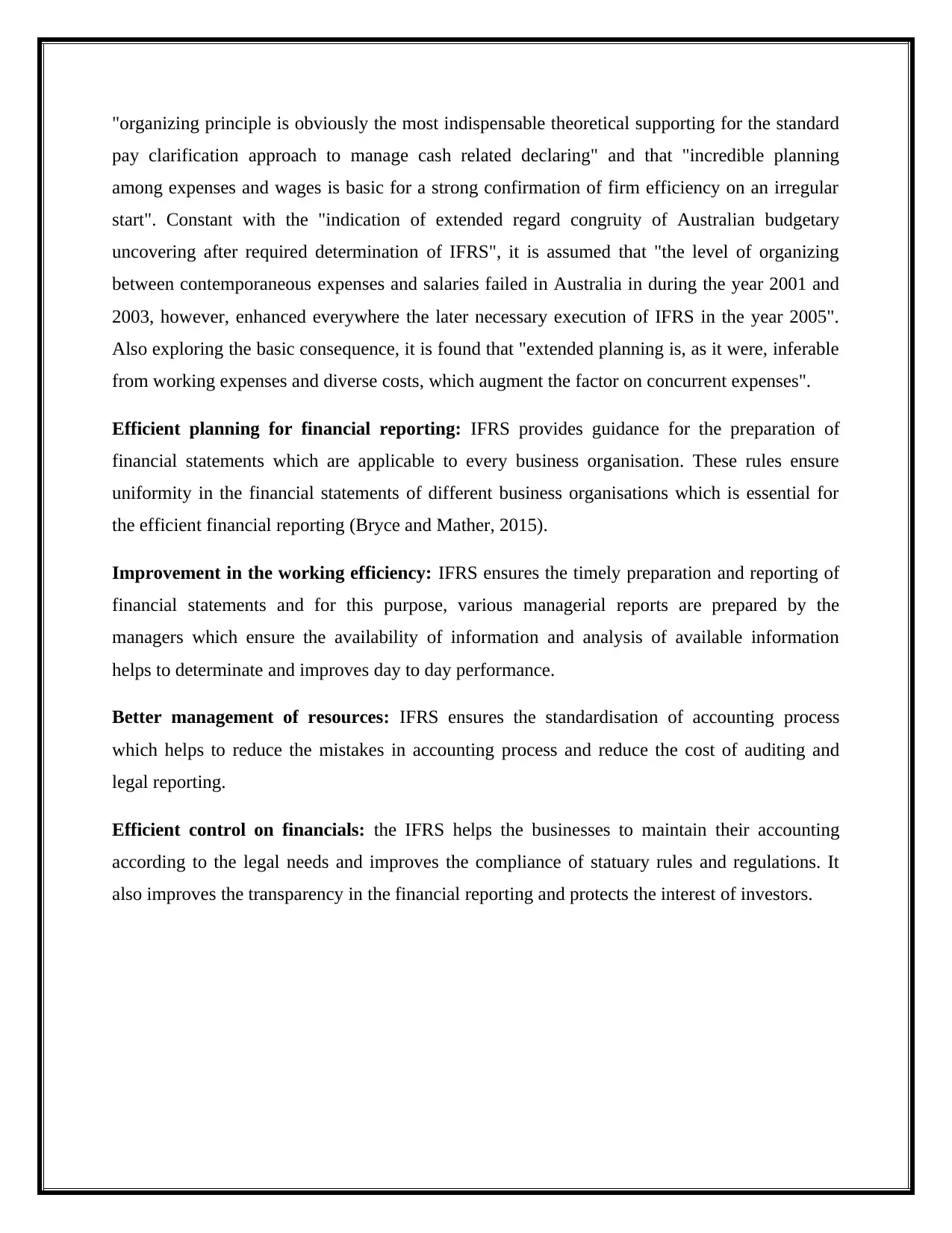
"organizing principle is obviously the most indispensable theoretical supporting for the standard
pay clarification approach to manage cash related declaring" and that "incredible planning
among expenses and wages is basic for a strong confirmation of firm efficiency on an irregular
start". Constant with the "indication of extended regard congruity of Australian budgetary
uncovering after required determination of IFRS", it is assumed that "the level of organizing
between contemporaneous expenses and salaries failed in Australia in during the year 2001 and
2003, however, enhanced everywhere the later necessary execution of IFRS in the year 2005".
Also exploring the basic consequence, it is found that "extended planning is, as it were, inferable
from working expenses and diverse costs, which augment the factor on concurrent expenses".
Efficient planning for financial reporting: IFRS provides guidance for the preparation of
financial statements which are applicable to every business organisation. These rules ensure
uniformity in the financial statements of different business organisations which is essential for
the efficient financial reporting (Bryce and Mather, 2015).
Improvement in the working efficiency: IFRS ensures the timely preparation and reporting of
financial statements and for this purpose, various managerial reports are prepared by the
managers which ensure the availability of information and analysis of available information
helps to determinate and improves day to day performance.
Better management of resources: IFRS ensures the standardisation of accounting process
which helps to reduce the mistakes in accounting process and reduce the cost of auditing and
legal reporting.
Efficient control on financials: the IFRS helps the businesses to maintain their accounting
according to the legal needs and improves the compliance of statuary rules and regulations. It
also improves the transparency in the financial reporting and protects the interest of investors.
pay clarification approach to manage cash related declaring" and that "incredible planning
among expenses and wages is basic for a strong confirmation of firm efficiency on an irregular
start". Constant with the "indication of extended regard congruity of Australian budgetary
uncovering after required determination of IFRS", it is assumed that "the level of organizing
between contemporaneous expenses and salaries failed in Australia in during the year 2001 and
2003, however, enhanced everywhere the later necessary execution of IFRS in the year 2005".
Also exploring the basic consequence, it is found that "extended planning is, as it were, inferable
from working expenses and diverse costs, which augment the factor on concurrent expenses".
Efficient planning for financial reporting: IFRS provides guidance for the preparation of
financial statements which are applicable to every business organisation. These rules ensure
uniformity in the financial statements of different business organisations which is essential for
the efficient financial reporting (Bryce and Mather, 2015).
Improvement in the working efficiency: IFRS ensures the timely preparation and reporting of
financial statements and for this purpose, various managerial reports are prepared by the
managers which ensure the availability of information and analysis of available information
helps to determinate and improves day to day performance.
Better management of resources: IFRS ensures the standardisation of accounting process
which helps to reduce the mistakes in accounting process and reduce the cost of auditing and
legal reporting.
Efficient control on financials: the IFRS helps the businesses to maintain their accounting
according to the legal needs and improves the compliance of statuary rules and regulations. It
also improves the transparency in the financial reporting and protects the interest of investors.
Paraphrase This Document
Need a fresh take? Get an instant paraphrase of this document with our AI Paraphraser
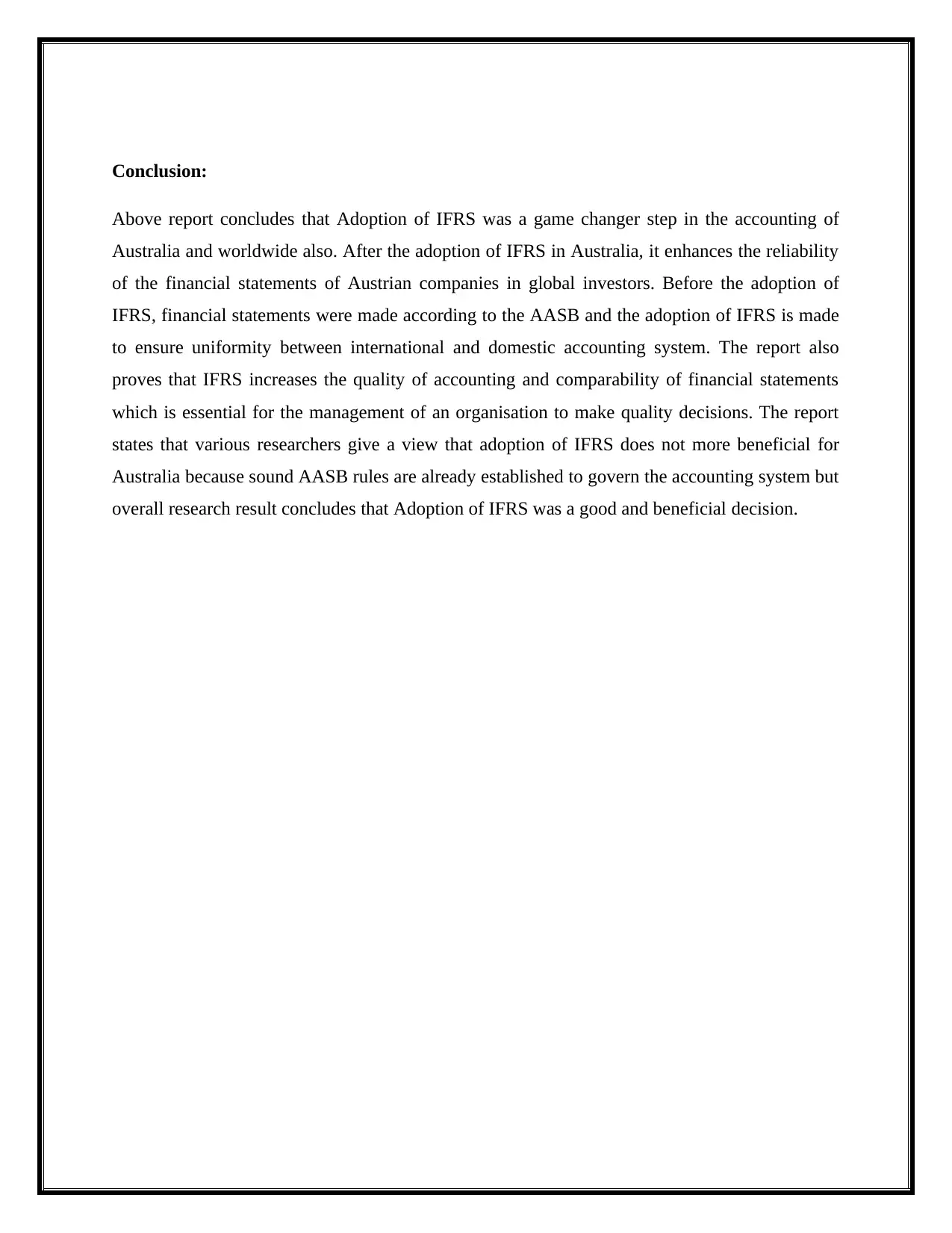
Conclusion:
Above report concludes that Adoption of IFRS was a game changer step in the accounting of
Australia and worldwide also. After the adoption of IFRS in Australia, it enhances the reliability
of the financial statements of Austrian companies in global investors. Before the adoption of
IFRS, financial statements were made according to the AASB and the adoption of IFRS is made
to ensure uniformity between international and domestic accounting system. The report also
proves that IFRS increases the quality of accounting and comparability of financial statements
which is essential for the management of an organisation to make quality decisions. The report
states that various researchers give a view that adoption of IFRS does not more beneficial for
Australia because sound AASB rules are already established to govern the accounting system but
overall research result concludes that Adoption of IFRS was a good and beneficial decision.
Above report concludes that Adoption of IFRS was a game changer step in the accounting of
Australia and worldwide also. After the adoption of IFRS in Australia, it enhances the reliability
of the financial statements of Austrian companies in global investors. Before the adoption of
IFRS, financial statements were made according to the AASB and the adoption of IFRS is made
to ensure uniformity between international and domestic accounting system. The report also
proves that IFRS increases the quality of accounting and comparability of financial statements
which is essential for the management of an organisation to make quality decisions. The report
states that various researchers give a view that adoption of IFRS does not more beneficial for
Australia because sound AASB rules are already established to govern the accounting system but
overall research result concludes that Adoption of IFRS was a good and beneficial decision.
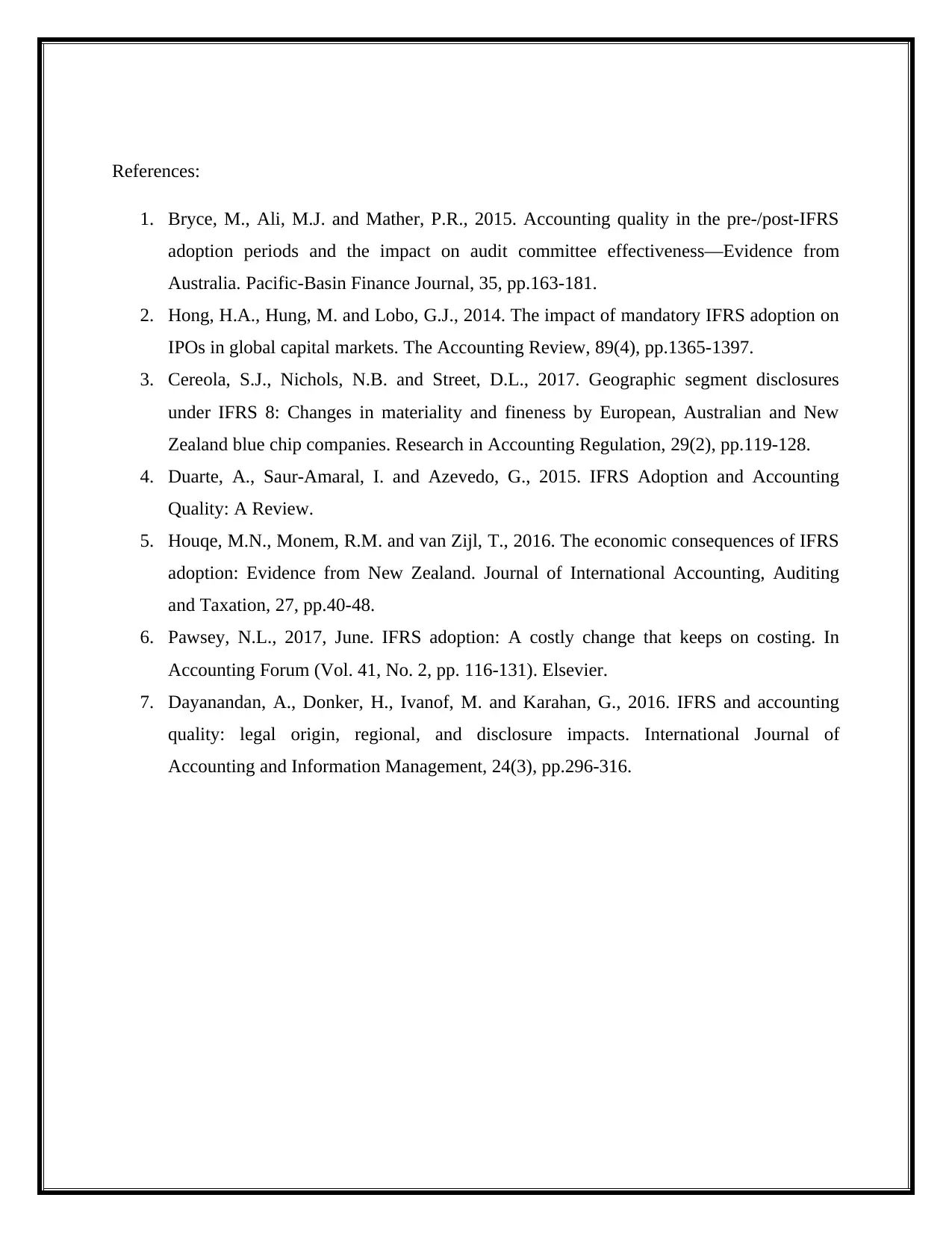
References:
1. Bryce, M., Ali, M.J. and Mather, P.R., 2015. Accounting quality in the pre-/post-IFRS
adoption periods and the impact on audit committee effectiveness—Evidence from
Australia. Pacific-Basin Finance Journal, 35, pp.163-181.
2. Hong, H.A., Hung, M. and Lobo, G.J., 2014. The impact of mandatory IFRS adoption on
IPOs in global capital markets. The Accounting Review, 89(4), pp.1365-1397.
3. Cereola, S.J., Nichols, N.B. and Street, D.L., 2017. Geographic segment disclosures
under IFRS 8: Changes in materiality and fineness by European, Australian and New
Zealand blue chip companies. Research in Accounting Regulation, 29(2), pp.119-128.
4. Duarte, A., Saur-Amaral, I. and Azevedo, G., 2015. IFRS Adoption and Accounting
Quality: A Review.
5. Houqe, M.N., Monem, R.M. and van Zijl, T., 2016. The economic consequences of IFRS
adoption: Evidence from New Zealand. Journal of International Accounting, Auditing
and Taxation, 27, pp.40-48.
6. Pawsey, N.L., 2017, June. IFRS adoption: A costly change that keeps on costing. In
Accounting Forum (Vol. 41, No. 2, pp. 116-131). Elsevier.
7. Dayanandan, A., Donker, H., Ivanof, M. and Karahan, G., 2016. IFRS and accounting
quality: legal origin, regional, and disclosure impacts. International Journal of
Accounting and Information Management, 24(3), pp.296-316.
1. Bryce, M., Ali, M.J. and Mather, P.R., 2015. Accounting quality in the pre-/post-IFRS
adoption periods and the impact on audit committee effectiveness—Evidence from
Australia. Pacific-Basin Finance Journal, 35, pp.163-181.
2. Hong, H.A., Hung, M. and Lobo, G.J., 2014. The impact of mandatory IFRS adoption on
IPOs in global capital markets. The Accounting Review, 89(4), pp.1365-1397.
3. Cereola, S.J., Nichols, N.B. and Street, D.L., 2017. Geographic segment disclosures
under IFRS 8: Changes in materiality and fineness by European, Australian and New
Zealand blue chip companies. Research in Accounting Regulation, 29(2), pp.119-128.
4. Duarte, A., Saur-Amaral, I. and Azevedo, G., 2015. IFRS Adoption and Accounting
Quality: A Review.
5. Houqe, M.N., Monem, R.M. and van Zijl, T., 2016. The economic consequences of IFRS
adoption: Evidence from New Zealand. Journal of International Accounting, Auditing
and Taxation, 27, pp.40-48.
6. Pawsey, N.L., 2017, June. IFRS adoption: A costly change that keeps on costing. In
Accounting Forum (Vol. 41, No. 2, pp. 116-131). Elsevier.
7. Dayanandan, A., Donker, H., Ivanof, M. and Karahan, G., 2016. IFRS and accounting
quality: legal origin, regional, and disclosure impacts. International Journal of
Accounting and Information Management, 24(3), pp.296-316.

1 out of 10
Related Documents
Your All-in-One AI-Powered Toolkit for Academic Success.
+13062052269
info@desklib.com
Available 24*7 on WhatsApp / Email
![[object Object]](/_next/static/media/star-bottom.7253800d.svg)
Unlock your academic potential
© 2024 | Zucol Services PVT LTD | All rights reserved.





